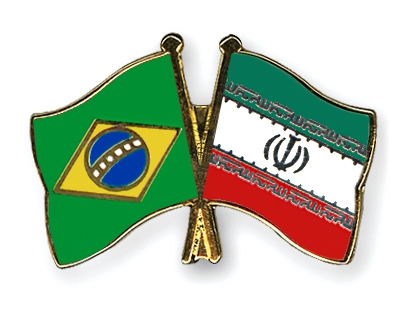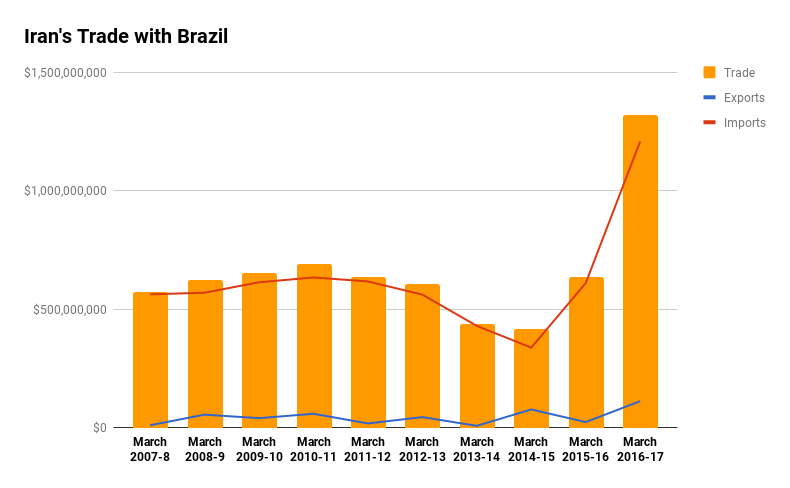
Iran-Brazil Chamber of Commerce Convenes

Kaveh Zargaran, the Iranian co-chair of the chamber, discussed a wide range of issues, including joint investments, ways of facilitating bilateral trade, banking measures to improve imports and exports, as well as holding exhibitions and marketing workshops.

The Brazilian delegation comprised representatives of businesses active in the fields of food and agro machinery and equipment production in Asia and the Middle East, ILNA reported on Saturday.
Apex-Brasil works to promote Brazilian products and services abroad and to attract foreign investment to strategic sectors of the Brazilian economy.
The agency’s efforts, according to its website, constitute trade and prospective missions, business rounds, support for the participation of Brazilian companies in international trade fairs, arrangement of technical visits of foreign buyers and other select activities designed to strengthen the country’s branding abroad.
It also plays a leading role in attracting foreign direct investment to Brazil, by identifying business opportunities, promoting strategic events and lending support to foreign investors willing to allocate resources in Brazil.
The Iran-Brazil Chamber of Commerce, launched in July this year with the aim of developing business ties between the two countries, is the first and only joint chamber with a South American nation.
Iran’s trade with Brazil has been on the rise since March 2014-15 fiscal year, reaching $1.32 billion last year (March 2016-17), the highest over the past decade, the Islamic Republic of Iran Customs Administration data show.
Last year, Iran exported $111.86 million worth of commodities to Brazil and imported goods valued at $1.2 billion in return.
However, the latest IRICA statistics indicate that bilateral trade significantly declined during the seven months to Oct. 22. Iranian exports to Brazil stood at $5.52 million, registering a 92.61% fall compared with last year’s corresponding period. Imports saw an 18.6% decrease year-on-year, to stand at $485.59 million.
Iran’s exported commodities over the seven months under review included dried grapes, glass dishes and industrial and laboratory furnaces. Imported goods mainly included red meat and pepper.



Trump weighs using $2 billion in CHIPS Act funding for critical minerals

Codelco cuts 2025 copper forecast after El Teniente mine collapse

Electra converts debt, launches $30M raise to jumpstart stalled cobalt refinery

Barrick’s Reko Diq in line for $410M ADB backing

Abcourt readies Sleeping Giant mill to pour first gold since 2014

Nevada army depot to serve as base for first US strategic minerals stockpile

SQM boosts lithium supply plans as prices flick higher

Viridis unveils 200Mt initial reserve for Brazil rare earth project

Tailings could meet much of US critical mineral demand – study

Kyrgyzstan kicks off underground gold mining at Kumtor

Kyrgyzstan kicks off underground gold mining at Kumtor

KoBold Metals granted lithium exploration rights in Congo

Freeport Indonesia to wrap up Gresik plant repairs by early September

Energy Fuels soars on Vulcan Elements partnership

Northern Dynasty sticks to proposal in battle to lift Pebble mine veto

Giustra-backed mining firm teams up with informal miners in Colombia

Critical Metals signs agreement to supply rare earth to US government-funded facility

China extends rare earth controls to imported material

Galan Lithium proceeds with $13M financing for Argentina project

Kyrgyzstan kicks off underground gold mining at Kumtor

Freeport Indonesia to wrap up Gresik plant repairs by early September

Energy Fuels soars on Vulcan Elements partnership

Northern Dynasty sticks to proposal in battle to lift Pebble mine veto

Giustra-backed mining firm teams up with informal miners in Colombia

Critical Metals signs agreement to supply rare earth to US government-funded facility

China extends rare earth controls to imported material

Galan Lithium proceeds with $13M financing for Argentina project

Silver price touches $39 as market weighs rate cut outlook

















